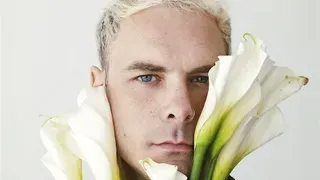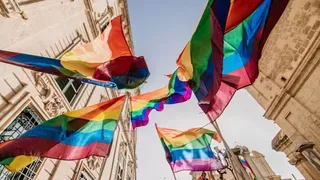May 11, 2010
Gen Silent Makes A Noise at Boston LGBT Film Festival
Kilian Melloy READ TIME: 7 MIN.
The documentary Gen Silent had its world premiere over the weekend at the Boston LGBT Film Festival. The screening took place at the Museum of Fine Arts; a reception followed a few blocks away, at Northeastern
University. Those in attendance included director Stu Maddux, the film's executive producer, Barrie J. Atkin, Associate Producer Dale Mitchell, Massachusetts State Rep. Liz Malia, Massachusetts Executive Office of Elder Affairs Secretary Ann Hartstein, and various supporters of the production, including LGBT Aging Project's director, Lisa Krinsky, and assistant director, Bob Linscott--the people who approached Maddux two years ago about making a film that would document the difficulties faced by the now aging generation that led the GLBT civil rights movement, a cohort that Maddux has called "our Greatest Gay Generation."
"We're gonna clean up the audio and color correct the film," Stu Maddux was saying to a rapt group of listeners who have been telling the director how his new documentary, Gen Silent, has affected them. "It's stuff you won't notice consciously."
"So you can change things?" asked one man.
"Oh, yeah," Maddux responded. "It's not like a Hollywood movie where a thousand prints are now out there. When I'm in the audience, I get feedback when people react a certain way... if they don't react the way I'd hoped, I can work on the film." Maddux identifies "a point about half way through, when people were shuffling in their seats, so I'll work on that."
It's impossible to have an interview with the director in the crush of the throng, so Stu leads EDGE to a quiet spot where we can have a quick chat.
Aside from looking for spots when the audience was restless, was Maddux pleased with the audience's reaction?
"Yeah, I was pleased," Maddux told EDGE. "It was really stressful working up to this; the film has been two years in the making, and my world had gotten extremely small for that last four months because I was sitting behind an editor for 18 hours a day and I wasn't eating right--nothing was going on in my life leading up to tonight. I was relieved that people get it."
That said, however, "It still needs work," Maddux told EDGE. "I couldn't get up there and say that because it would have disappointed people, but we tried very hard to get as done as we could for tonight."
Will there be a definitive final version at some point? Or will Maddux keep tinkering as the film makes the rounds to film festivals?
"It'll be an ongoing process, but not for much longer," Maddux said. "These first couple of film festivals are when you make the big changes, and then it's done. We'll do a recut and make a shorter version for institutional continuing education, so the people who really need to know will get a chance to see this. That's what we think will make a lot of change [in the current climate that GLBT elders face]."
As the Baby Boomers age, it was inevitable that the needs of GLTB seniors wouldn't come to light; like any other demographic group, the Boomers include a certain percentage of gays, lesbians, bisexuals, and transgendered individuals. A recent EDGE story reported on an April 28 Congressional hearing meant to look into "the added burden of a lifetime of stigma" that elder GLBTs face, including "familial relationships that lack recognition under the law; and unequal treatment under laws, programs, and services designed to support and protect older Americans."
"I'm pleased with the timing," Maddux reckoned. "It's just good fortune. It wasn't planning or anything like that. It's what you always want. You want to be there when [your subject] is on everybody's mind." The intense debate on national health care reform, too, had the effect of opening more people's eyes to the plight of GLBT seniors: "We got a lot more hits to our web site because of that," Maddux said.
EDGE asked whether Maddux thought GLBT Americans might gain legal parity at some watershed moment of sweeping change, of whether he thought it was likely that the community would have to struggle to obtain equality before the law piecemeal, taking decades to tackle each separate issue--DOMA, DADT, immigration and bi-national family rights, freedom from persecution by religions and ballot initiatives designed to attack and revoke GLBT civil rights.
Maddux zeroed in on DOMA, the so-called "Defense of Marriage" Act, a federal law from 1996 that takes aim at gay and lesbian families by denying them any form of federal recognition. "My concern is that if DOMA isn't handled correctly, then GLBT equality will become a state's rights issue--and it'll become [a situation analogous to] the Jim Crow laws, where gay people will migrate to places where they can be gay, and straight people will [continue to persecute them and drive them out of anti-gay states]. It'll be just like it was a hundred years ago [with African Americans]. It's happening right now; gay people are moving to different states where they might have the right to marry.
"[On the other hand], if DOMA is taken out, it'll be like a cornerstone [being removed] and the whole [edifice of anti-gay legislation] will crumble," Maddux said, though that latter scenario seemed unlikely to him. "I just think that this country has a history of going really slowly on civil rights, and I would not be surprised if it took another hundred or two hundred years for us to be on par with heterosexuals in all parts of this country."
Gen Silent pinpoints one major source of anxiety for GLBT elders as a deeply ingrained distrust of institutions, given that the medial establishment pathologized gays for so long and used such barbaric treatments on them in attempts to "cure" them--treatments that could be so harmful and psychologically devastating that some patients killed themselves, and others, faced with the prospect of electroshock, lobotomies, or other abuses, committed suicide to save themselves from such a fate. Other institutions, such as the law, government, the military, and churches, have also been (and continue to be) extremely hostile to gays. It's no wonder, then, that many elder GLBTs, as they enter a vulnerable life stage, are terrified of being the helpless victims of potential abusers, including nursing staff who quote anti-gay Biblical passages, tell the gay elders in their care that they are "going to Hell," and pressure them to "change" to heterosexuality.
But today's GLBT youth are coming out sooner than ever and with greater confidence and social acceptance. When they are entering their elder years, it's hard to imagine that they will accept any form of anti-gay harassment.
The problem, however, Maddux points out, is that elders are more physically and mentally vulnerable than the younger people on staff who might abuse them. Then there are the "bullies" among the elder population--homophobic senior citizens who might band together to shun and scapegoat a gay or lesbian resident at a nursing home or other assisted living facility. Gen Silent documents all of those form of anti-gay discrimination and harassment, as well as the lack of community and familial support that elder GLBTs face.
"As long as there is another person in their environment that could threaten them, like a teenager in school, then we have a problem," Maddux said. "I do think that anti-bullying legislation is important," he added, theorizing that if intervention in anti-gay abuse starts in school, people will learn better, less violent habits for life. "We hear about these old men who are bullies, now, picking on gay people in nursing homes. We have got to break that cycle."
EDGE recounted being asked that same day by an elder heterosexual woman whether distinctions like gay and lesbian are meaningful past a certain point, when an individual's interest in sexual activity--or capacity to engage in it--has faded.
Maddux noted that being GLBT isn't simply a matter of sexual practices. "I think that we are a culture," he told EDGE. "Whether young people want to accept that right now, they are part of the LGBT culture. They want to be homogeneous, and they just want to be out there [in the mainstream]. But the fact of the matter is that our culture is important to us, to our dying day. Whether we want to be accepted or not... You look at [longtime couple] Lois and Sheri in the film, and yes, it's one of the most important things for them to identify as lesbians, because for so long they couldn't." Sexuality might fade with age, but romance and deep personal connection survive the ravages of time.
A few minutes later, State Rep. Liz Malia presented Maddux with a citation from the Massachusetts House of Representatives. The citation said that the "entire membership extends its very best wishes" to the filmmaker. Maddux held up a large videocassette tape and told his audience, "Here's the film. Here it is. A mile and a half of tape, two years of work, a $180,000 budget, a year in the lives of six people."
It had been a journey for the filmmaker, too: that much is obvious as he looked at the audience and invited them to, "Please become involved in this film. You can tell it's going to help people."
Dale Mitchell took the podium to challenge the crowd to contribute funds for the project, vowing to match up to $500 if he could get that much in pledges. One women in the crowd pointed directly at him: "Match ya!" she cried, to a burst of applause and cheers. Others joined in. One person, then another, pledged one hundred dollars; someone called that they would contribute two hundred. Someone pledged fifty dollars. Applause followed each pledge. "A hundred!" called still another individual. Mitchell glanced in his direction and exclaimed, "One hundred--from a young person!"
A gentleman from New York named Frank pledged a sum. His husband Andy chimed in, "From both of us!"
"You're together?" asked Mitchell.
"Thirty-six years!" the men responded. The room resounded with laughter and applause.
An encore screening of Gen Silent is scheduled for May 11 at 7:00 p.m. at The Brattle Theatre in Harvard Square, Cambridge.
Kilian Melloy serves as EDGE Media Network's Associate Arts Editor and Staff Contributor. His professional memberships include the National Lesbian & Gay Journalists Association, the Boston Online Film Critics Association, The Gay and Lesbian Entertainment Critics Association, and the Boston Theater Critics Association's Elliot Norton Awards Committee.







